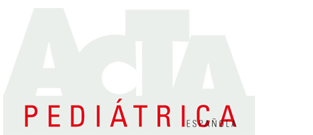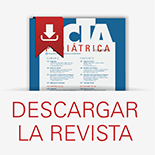Información adicional
- Num_publicacion 74(2)
-
Resumen_ingles
The concept of pedagogy at the hospital should keep in mind four key ideas: a) humanization is the cornerstone of the healthcare since the XXI century; b) hospital pedagogy should be considered as a unit within the pediatric department; c) hospital pedagogy goes further than medicine and special education, and d) pedagogical strategies used in clinical medical education is not only a classroom inside the hospital, considering that its work goes one step beyond.In this article we discuss some general aspects of the Pedagogical Hospital Units from the Comunidad Valenciana and focus your attention in our experience from the Department of Pediatrics at the Hospital General Universitario from Alicante. In base our experience, it could concluded that Pedagogical Hospital Units should become a teaching tool and also therapeutic tool, fully integrated in the Pediatric Department and their work is a good opportunity to opening up to the world of a "liquid hospital", that means a transgression of the walls in order to life in society.
- Palabras_clave_ingles Teaching Hospitalization Pedagogical Hospital Unit Humanization
- Todos_autores J. González de Dios1, R. Pérez López2, M. Ibáñez Criado2
- autores listados J. González de Dios, R. Pérez López, M. Ibáñez Criado
-
Correspondecia
J. González de Dios. Avda. Eusebio Sempere, 6, 3.º A. 03003 Alicante.
Correo electrónico: javier.gonzalezdedios@gmail.com - Titulo_ingles Pedagogical Hospital Unit makes teaching and medical aid more human
- Centros_trabajo 1Servicio de Pediatría. Hospital General Universitario de Alicante. Departamento de Pediatría. Universidad «Miguel Hernández». Alicante. 2Profesora de la Unidad Pedagógica Hospitalaria. Hospital General Universitario de Alicante. Alicante
- Publicado en Acta Pediatr Esp. 2016; 74(2): e21-e28
- copyright ©2016 Ediciones Mayo, S.A.
- Fecha recepcion 3/08/15
- Fecha aceptacion 28/08/15
- Tipo de Artículo Clínico (Microdatos) Review
Información adicional
- Num_publicacion 65(3)
-
Resumen_ingles
A substantial part of current routine practice in neonatology is focused on premature infants, especially those having a very low birth weight, the group associated with the highest rates of morbidity and mortality. The problems that these children may develop usually follow a temporal sequence. The know¬ledge of this common pattern enables the clinician to concentrate his attention on each predictable event as it occurs, aiding him in the diagnosis and the treatment of the patient. The aim of this paper is to describe this temporal pattern, the reasons that explain it and some considerations regarding treatment, for possible use as a tool in the training of residents in neonatology. We feel that the understanding of this issue has important implications for all the professionals involved in the care of newborn infants.
- Palabras_clave_ingles Premature newborn teaching early diagnosis neonatology
- Todos_autores T. Sánchez-Tamayo, R. Maese Heredia, M. Rodríguez-Vives, M. García del Río
- autores listados T. Sánchez-Tamayo, R. Maese Heredia, M. Rodríguez-Vives, M. García del Río
-
Correspondecia
T. Sánchez-Tamayo. Unidad de Neonatología. Hospital Materno-Infantil «Carlos Haya». Avda. Arroyo de los Ángeles, s/n. 29010 Málaga.
Correo electrónico: tomas.sanchez.sspa@juntadeandalucia.es - Titulo_ingles “Chronological” diagnosis in neonatology
- Centros_trabajo Unidad de Neonatología. Hospital Materno-Infantil «Carlos Haya». Málaga
- Publicado en Acta Pediatr Esp. 2007; 65(3): 106-110
- copyright ©2007 Ediciones Mayo, S.A.
- Fecha recepcion 06/02/06
- Fecha aceptacion 17/02/06














